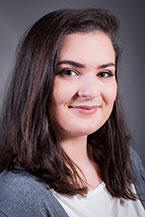On February 1, I had the privilege of attending the Martin Luther King Jr. Remembrance and Rededication Ceremony at Manchester University. This was the 50th anniversary of Dr. King’s visit to Manchester in 1968, his last before his assassination. If you did not attend this event, I am hoping that this account provides a representation of the inspiration and awe that I felt after this ceremony.
I recognize that I am perhaps not the best person to share how this legacy or this ceremony affects my daily life at Manchester. I am a privileged, young white woman who has not faced much discrimination. In this vein, I simply hope to provide a recap and some powerful quotes that I noted and wish to revisit some of the incredible points made in this presentation.
The VIA opened with Chris Ford & Power of Praise singing selected hymns. I won’t spend much time on the music, only because there is no possible way to express in words the power and passion that this group had. I can only highly encourage you to look up Chris Ford and his group, because the powerful and tremendous music brought an element of passion and reverence to the event that is indescribable. Following this performance, Michael Dixon introduced the first speaker, Myron Chenault.
Myron Chenault, ’71, told us that he spoke with both extreme happiness and sadness on this day. Sadness, he said, because he would rather speak about a man who was still with us. He said that Dr. King “provided the boots so that others could pull themselves up by their bootstraps.” Chenault was happy, however, because Dr. King’s visit was one of the most exciting days of his life. He expressed the isolation of being a black person on the Manchester campus in 1968. “There were more African Americans at my dinner table at home than on campus,” he recalled. He said that Dr. King discussed the theory of light; that we can either relish in the light of creative altruism or in relegate ourselves into dark selfishness. Dr. King also said, "he who is devoid of the power to forgive is devoid of the power to love, and violence multiplies violence in a descending spiral." Dr. King and Chenault believed in Manchester and its mission, striving towards intellectual and spiritual development.
Follow Myron Chenault’s address, Sue Wells, ’70, spoke to the auditorium. She recalled exactly where she sat and what she wore on the day Dr. King came to campus. Wells was the only black person in her graduating class, out of six total on campus. When she saw Dr. King, she felt like her heart would leave her chest. She said his presentation was art that held you in awe, it felt like he knew intimately the rejection and fear that she felt during integration. “He must have known my heart,” she said. When she sat with Dr. King face to face, he was human, normal, and down to earth. He noticed every person at that table and talked to them. Wells reminded us of Dr. King’s call; to give ourselves to the struggle until the very end- nothing would be more tragic than to give up now.
The next speaker, Steve Stone, ’69, had four generations of family attend Manchester. He is a white man who did not grow up experiencing other cultures, but is now heavily involved in the Black Church Coalition in Lexington, Kentucky. He told us that we can all become involved at race relations, and encouraged Manchester to consider diversity in the students they enroll, faculty and staff they employ, art and scholars they reference, to include black authors on reading lists for classes, and to practice sensitivity and skill towards minority populations. “Racism is more akin to cancer than polio,” he said. “Polio has been eradicated.” Although we are making strides every day, the cancer of racism is still around us.
Jo Young Switzer, ’69, remembers how Dr. King listened, laughed, and asked questions of the students. He asked them, “what are you doing about race relations?” Switzer asked us to reflect; what would you say if someone asked you that now? Would you have an answer, or could you do more? It is the responsibility of those with privilege to address this issue.
The keynote speaker of the event was Reverend Otis Moss III. He called Dr. King one of the greatest prophets America has ever produced. The Reverend reminded us to not lift the sanitized version of Dr. King, the one America has become comfortable with now that he is safely dead. Instead we should lift up King’s legacy of resistance to any system that was unjust, whether that resistance was popular or not. We have a responsibility to open the door for someone else, the way many have opened doors for us. We have a responsibility to thank those that took the bruises that were intended for you. We have a responsibility to acknowledge that without people of every nationality and ethnicity, we would not be able to enjoy the freedom and culture that we do without thought or thanks. I encourage you all to look into Reverend Otis Moss’ sermons. Whether you are religious or not, I am confident that his tremendous eloquence and compelling communication will move you.
I think this VIA exemplified what Manchester does and should continue to lift up. A legacy of nonviolent resistance, standing up to injustice, and celebration of diversity. A continuation of the beloved community.
Sermons by Reverend Otis Moss III:
https://www.youtube.com/watch?v=EmD4katcO_0

Virginia Rendler ’20 is a Peace Studies major, and is hoping to double major in English, as well as double minor in Spanish and Visual Art. She loves animals and is a Leo.